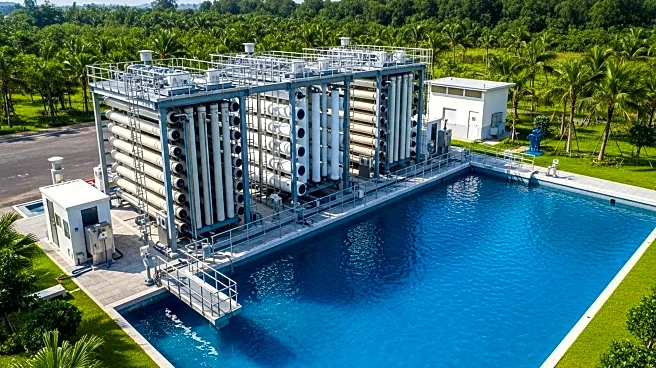What's Happening?
Modern desalination techniques are being recognized for their minimal ecological impact, particularly concerning brine discharge. Despite common fears about environmental harm, scientific evidence and real-world monitoring have shown that advanced engineering and strict regulations ensure that brine discharge from desalination plants is rapidly diluted and ecologically localized. This process is crucial for water security, especially in regions facing severe water scarcity due to climate change. Countries like Australia, Israel, the United States, and Chile have demonstrated that with responsible design and adaptive management, desalination can provide a sustainable solution without compromising ocean health.
Why It's Important?
The significance of modern desalination lies in its ability to address water scarcity, a pressing global issue affecting over 2.3 billion people. As traditional freshwater sources become strained, desalination offers a climate-resilient alternative, ensuring a reliable supply of high-quality water. This is particularly vital in arid regions like the Southwestern United States, where freshwater availability is predicted to decrease significantly. By mitigating the environmental risks associated with brine discharge, desalination supports food security and livelihoods, making it an essential component of sustainable water management strategies.
What's Next?
Continued application of scientific rigor and evidence-driven policy will be crucial in ensuring that desalination remains a cornerstone of water security. As global water demand is expected to rise by 55% by 2050, further advancements in desalination technology and management practices will be necessary to meet this demand sustainably. Stakeholders, including governments and environmental groups, will likely focus on enhancing desalination infrastructure and monitoring systems to balance water security needs with ecological preservation.
Beyond the Headlines
The broader implications of modern desalination extend to its role in mitigating the economic and social consequences of water scarcity. By providing a drought-proof water supply, desalination helps prevent over-extraction from natural sources, which can lead to irreversible environmental damage. This approach not only supports marine ecosystems but also complements conservation and reuse strategies, highlighting the importance of integrated water management in the face of climate change.










